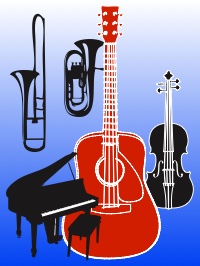Is Music Theory For Guitar Different Than Music Theory For Other Instruments?


Having a website called "Music Theory For Guitar" is a source of endless interesting discussions on all aspects of guitar and music in general. For instance I recently got this comment on my FB page:
"Music theory is music theory, same on any instrument, (EXPLETIVE)! "
Fact is, I actually agree with the gentleman who posted the comment. In principle, music theory SHOULD be the same for all instruments.
And yet there IS a difference. And it's important for guitar players to know this difference otherwise learning theory becomes much harder than it should be.
Most Theory Resources Are Written From The Point Of View Of Piano Players.
If you pick up any book on music theory, you will notice that they all assume that the reader has some specific skills, for instance:
- being able to read music from a score,
- being able to play chords and harmonies on a keyboard
This is because originally books on music theory were written for academic institutions (like the Royal Conservatory) where the student was (and still is) supposed to learn at least basic piano skills even if their main instruments was different.
Many later music theory resources were simply 'copied' from these books, which partly explains why music theory seems so hard to guitar players. Even if the book you are reading (or the online course you are following) was made for guitar, it may simply be 'inspired' by a piano curriculum.
The Guitar Does Not Work Like Any Other Instrument
The problem with all the above is that the guitar is fundamentally different from any other instrument:
For instance, on the guitar fretboard the notes are also distributed in 2 dimensions (over 6+ strings) and you have patterns for scales, arpeggio, and other structures that are the same for every key. A pentatonic scale pattern is the same for the key of D and the key of G: only its position on the fretboard changes.
Compare this with the piano who has all the notes conceptually on a line (and different patterns per key/chord), or with winds/brass fingering with notes not on a line and with key-dependent patterns.
One can argue that string instruments like violin/cello are similar, but their tuning is different (in 5ths, not in 4ths like the guitar) and as far as I know they are not usually played with patterns.
Also, the modern guitar is NOT used like ANY other instrument (see below).
All these elements together add up to the fact that a guitarists understand his or her instrument in a different way than a pianist understands a piano. I'm not saying it's better or worse, but it IS definitely different - and so this calls for a different way to teach and learn theory.
The Work That A Guitar Player Does Is Different Than Any Other Instrument
Another important point is that the guitar is an instrument that can be both rhythmic/chordal and melodic, and as guitarists we are often called to improvise or write our own parts.
This is something that happens at all levels - it definitely happens in most jam sessions, but the surprising thing is that it can happen to orchestra pit musicians as well.
For instance take the Broadway musical "Hair": the official score for guitar is made mostly by chord charts. The guitar player is called to write all the guitar parts (riffs, rhythms, leads, etc) for each of the 51 cues of the musical.
ALL the other instruments in the musical (drums included) have instead a detailed note-by-note score in standard notation. I remember the keyboard player asking me: "I could not work from THAT! How do you do it?" Answer: I know the music theory that is appropriate for guitar, i.e. I know how to translate a chord chart into guitar parts in real time.
(And you can do it too, it's not as hard as it seems)
(NOTE: Some musicals have a standard notation score for guitar too: to work in those situation you need to be a good improviser AND a good sight reader!)
So as you can see the FOCUS of the study of music theory is different for different instruments, and it depends on what you want to do with it. While theory is still theory, some people specialize in execution (sight reading), or in improvisation, or in composition, or in analysis... or they study ALL these things, why not? :)
So Is Music Theory The Same On Any Instrument?
TL;DR The question is: is music theory for guitar the same as music theory in general?
Well, in theory it is. But as we have seen, in practice it is not the same, and the difference is important :-)
Make sure to study on resources that are made specifically for guitar and NOT 'recycled' from other instruments, and you will see that music theory is not only simple, but incredibly useful and practical.
You can find resources on music theory from a guitarist's point of view here: Music Theory Lessons for Guitar